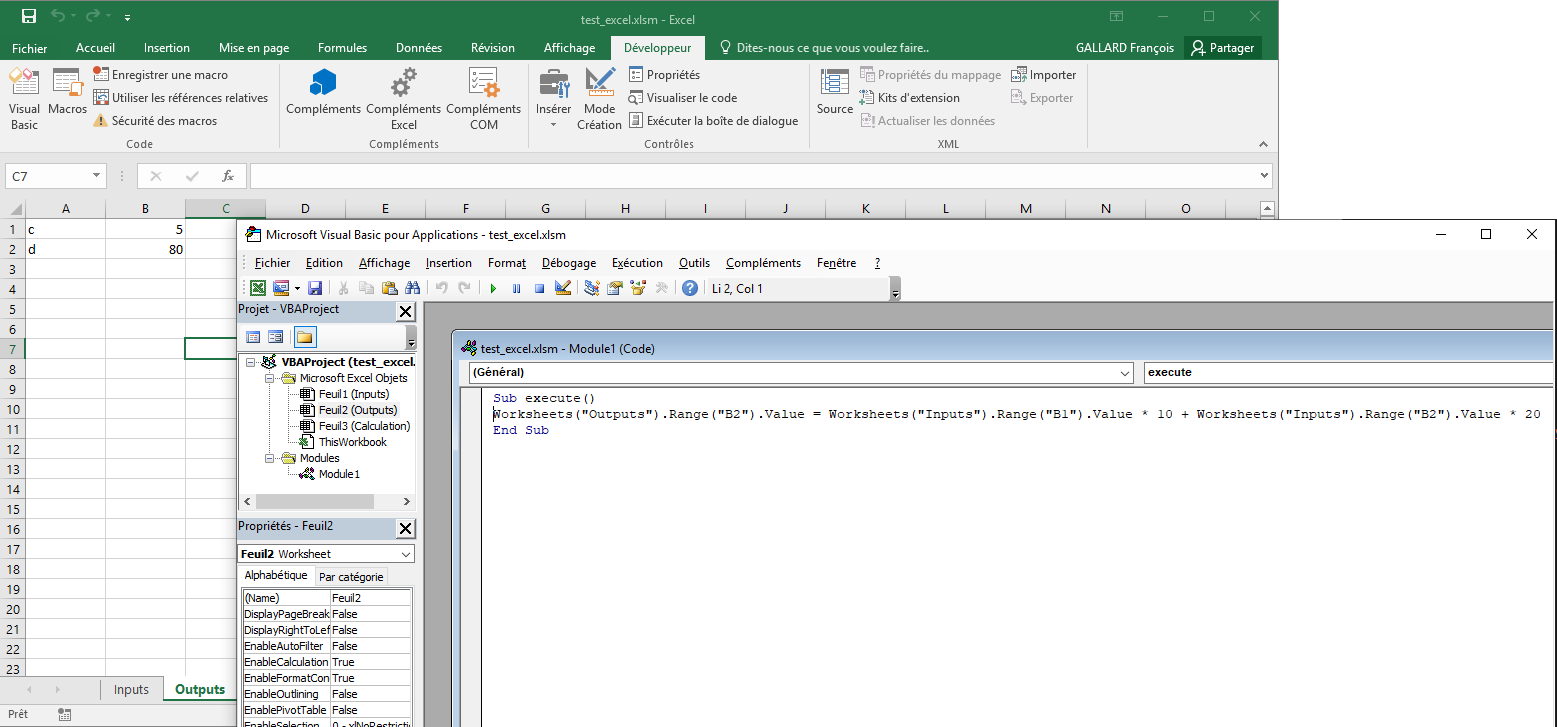Excel wrapper¶
This section describes how to use an XLSDiscipline with
a practical application using a simple discipline in a DOEScenario.
Imports¶
We start by importing all the necessary modules and configuring the logger.
from numpy import array, ones
from gemseo.api import create_design_space, configure_logger, create_scenario
from gemseo.wrappers.xls_discipline import XLSDiscipline
configure_logger()
Create an XLSDiscipline¶
For this simple problem, the Excel book will compute \(c=a+b\).
Create the Excel file that will compute the outputs (
c) from the inputs (a,b). Inputs must be specified in the “Inputs” sheet:A
B
1
a
3
2
b
5
“Inputs” sheet setting \(a=3\) and \(b=5\).
Warning
The number of rows is arbitrary but they must be contiguous (no empty lines) and start at line 1.
The same applies for the “Outputs” sheet:
A
B
1
c
8
“Outputs” sheet setting \(c=8\).
Instantiate the discipline. For this basic implementation we only need to provide the path to the Excel file:
my_book.xlsx.
xls_discipline = XLSDiscipline('my_book.xlsx')
Instantiate the scenario¶
The scenario requires a DesignSpace defining the design variables a and b:
design_space = create_design_space()
design_space.add_variable("a", 1, l_b=0.0, u_b=10.0, value=array([1]))
design_space.add_variable("b", 1, l_b=-10.0, u_b=10.0, value=array([2]))
Create the DOEScenario with the XLSDiscipline, the DesignSpace and an MDF formulation:
scenario = create_scenario(
xls_discipline,
formulation="DisciplinaryOpt",
objective_name="c",
design_space=design_space,
scenario_type='DOE',
)
Execute the Scenario¶
Define the execution options using a dictionary, then execute the scenario. Here, we use a CustomDOE and
provide two samples to be evaluated:
sample_1 = [1, 2] # a=1, b=2
sample_2 = [2, 3] # a=2, b=3
samples = array([sample_1, sample_2])
scenario.execute({"algo": "CustomDOE", "algo_options": {"samples": samples}})
print(scenario.export_to_dataset().export_to_dataframe())
Which prints the results of the computation as follows:
design_parameters functions
a b c
0 0 0
0 1.0 2.0 3.0
1 2.0 3.0 5.0
Parallel execution considerations¶
GEMSEO relies on the xlswings library to communicate with Excel. This imposes some constraints to our development. In particular, we cannot pass xlwings objects between processes or threads. We have different strategies to comply with this requirement in parallel execution, depending on whether we are using multiprocessing, multithreading or both.
In the following, we no longer use the previous discipline to illustrate these parallel execution considerations but an
XLSDiscipline named xls_discipline and strongly coupled to another discipline called other_discipline.
The idea is to minimize the objective function "f" computed by this multidisciplinary system over a design_space.
For that, we will use the MDFFormulation:
scenario = create_scenario(
[xls_discipline, other_discipline],
formulation="MDF",
objective_name="f",
design_space=design_space,
scenario_type='DOE',
)
Multiprocessing¶
In multiprocessing, we recreate the xlwings object in each subprocess through __setstate__. However,
the same Excel file cannot be used by all the subprocesses at the same time. Which means that we need a
unique copy of the original file for each one.
The option copy_xls_at_setstate shall be set to True whenever an XLSDiscipline
will be used in a ParallelExecution instance implementing multiprocessing.
If we wanted to run the previously defined scenario in parallel, then the discipline instantiation would be:
xls_discipline = XLSDiscipline('my_book.xlsx', copy_xls_at_setstate=True)
The algo options would change as well to request the number of processes to run:
input_data = {"algo": "CustomDOE", "algo_options": {"n_processes": 2, "samples": samples}}
And the execution call shall be protected:
if __name__ == '__main__':
scenario.execute(input_data)
Multithreading¶
In multithreading, we recreate the xlwings object at each call to the XLSDiscipline. Thus, when
instantiating an XLSDiscipline that will be executed in multithreading, the user must set recreate_book_at_run=True.
Warning
An MDAJacobi uses multithreading to accelerate its convergence, even if the
overall scenario is being run in serial mode. If your XLSDiscipline is inside an MDAJacobi, you must
instantiate it with recreate_book_at_run=True.
Going back to the example scenario, if we want to run it using an MDAJacobi then the
XLSDiscipline would be created as follows:
xls_discipline = XLSDiscipline('my_book.xlsx', copy_xls_at_setstate=True)
The scenario creation would specify the MDA:
scenario = create_scenario(
[xls_discipline, other_discipline],
formulation="MDF",
main_mda_class="MDAJacobi",
objective_name="f",
design_space=design_space,
scenario_type='DOE',
)
The scenario execution remains the same:
input_data = {"algo": "CustomDOE", "algo_options": {"samples": samples}}
scenario.execute(input_data)
Multiprocessing & Multithreading¶
There is one last case to consider, which occurs when the XLSDiscipline will run in multithreading mode
from a subprocess that was itself created by a multiprocessing instance. A good example of this particular
situation is when a DOEScenario runs in parallel with an MDAJacobi that solves the couplings for
each sample.
It will be necessary to set both copy_xls_at_setstate=True and recreate_book_at_run=True.
In our example, the XLSDiscipline instantiation would be:
xls_discipline = XLSDiscipline('my_book.xlsx', copy_xls_at_setstate=True, recreate_book_at_run=True)
The scenario would be created as follows:
scenario = create_scenario(
[xls_discipline, other_discipline],
formulation="MDF",
main_mda_class="MDAJacobi",
objective_name="f",
design_space=design_space,
scenario_type='DOE',
)
The algo options would change as well to request the number of processes to run:
input_data = {"algo": "CustomDOE", "algo_options": {"n_processes": 2, "samples": samples}}
And the execution call shall be protected:
if __name__ == '__main__':
scenario.execute(input_data)
What about macros?¶
The next figure illustrates how a macro can be wrapped to compute outputs from inputs.
You shall pass the name of the macro with the option macro_name at instantiation.

Example of macro that can be wrapped¶
